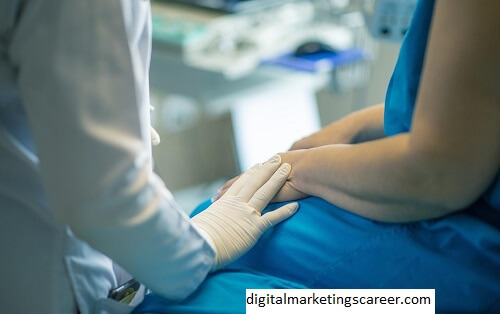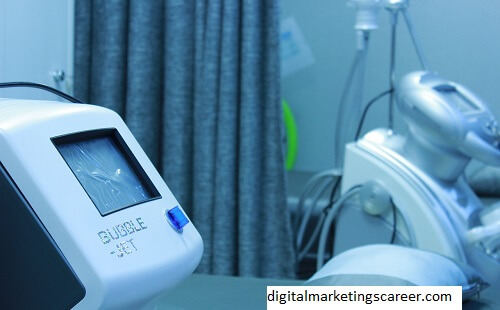Dermatology Digital Marketing A Step-by-Step Guide:
Digital:
With the advent of the digital age, marketing has evolved beyond print, television, and radio. Dermatologists and healthcare in general are also going digital to find new patients, gain trust, and improve their reputation as a practice. Under such intense competition, the House of Dentistry must unlock more access to the marketplace where an informed patient makes decisions for health care because of the change in how search, review, and social scrutiny influence choices.

Today, we will explore the different aspects of dermatology digital marketing and its importance, as well as several strategies on how to apply these tools for growth in dermatology practices. We have also answered some of the most frequently asked questions in dermatology digital marketing.
Importance of Digital Marketing for Dermatologists:
Digital:
Dermatology is just like every other branch of medicine; it is very competitive. The fact that a higher percentage of people are seeking health-related services online makes it imperative on the need for dermatologists to develop a good online presence. There are many benefits that digital marketing offers over the old method:
1. Further Reach and Visibility:
It is this internet that patients first look for answers to their skin conditions or need treatment for their conditions. As such, a thought-through digital marketing plan can, therefore, highly improve the viewability of your practice. Optimizing your website as well as using Google Ads or social media, for instance, will help place your dermatologist at the top of search results that most directly impact patient decision-making.
2. Patient Engagement:
For example, in digital marketing, dermatologists can reach potential patients even before they get to your office. Whether it is creating informative blog posts or educational videos or linking through social media, online engagement creates trust and perpetuates your reputation as a professional in your field.
3. Low Cost Advertisements:
Traditional methods of advertisement, like TV commercials, print ads, and billboards, are pretty costly. Digital marketing, however, is significantly much more affordable as well as has options that now involve paid social media ads and Google Ads; to reach a desired audience without breaking the bank.
4. High Retention Rate:
With the successful attraction of patients, digital marketing can engage them with your practice. Regular newsletters, email campaigns, and personalized follow-ups keep them atop your minds-resulting in repeat visits and referrals.
5. Brand Building and Reputation Management:
Online reviews and patient testimonials form the bedrock of the reputation of a dental practice. Patients have more trust in a dermatologist when there are good reviews on Google, Yelp, or Healthgrades. Digital marketing tools help you to manage your reputation well online.
Important Digital Marketing Strategies for Dermatologists:
To take all the advantages of digital marketing, dermatologists need to make sure the correct strategies are in place. Such strategies happen to be the best marketing for dermatology practices as outlined below:
1. Search Engine Optimization (SEO):
SEO is the method of giving your website a form of optimization to help it rank higher in results, particularly on Google. The basic idea is that when your prospective patients have been searching for dermatology services in your area, it ought to feature in the first results.
Good SEO for any dermatologist will include:
- Keyword Optimization: Find some relevant keywords relating to the content of your website. Keywords may be phrases such as “dermatologist near me,” “acne treatment,” or “skin cancer screening.”
- Local SEO: Local SEO is very important as dermatology is a local service. Get your practice listed on Google My Business and keep updating it.
- Content Creation: Publishing blog posts about common dermatological conditions or treatments can help improve your website’s SEO ranking. These posts should provide valuable, informative content to attract patients searching for solutions.
2. Google Ads and Pay-Per-Click (PPC) Advertising:
Digital:

- PPC advertising allows dermatologists to bid for keywords that trigger ads in search engine results. Unlike SEO, which is a long-term strategy, PPC provides immediate visibility.
- Google Ads can be too wonderful for targeting active searchers of dermatological services. For example, if someone searches for “best dermatologist for acne treatment in [city],” then your advertisement will show if you are bidding on the relevant keywords.
- PPC ads allow very fine-tuned changes and thus let dermatologists concentrate on specific services like cosmetic dermatology or detection of skin cancers, depending upon your services.
3. Social Media Marketing:
Today’s dermatologists could use social media platforms as power tools to connect and build relationships with both current and new patients, including active accounts on Instagram, Facebook, and TikTok, where one could educate and get connected with their community, besides showing off their skills.
Very effective social media marketing strategies for a dermatologist:
- Educational Content: Share skin care tips, explain common conditions of eczema or psoriasis, and post before-and-after photos with permission and, of course, evidence of how treatments work.
- Live Q&A Sessions: Host live sessions or Instagram Stories to connect patients to you in real-time for immediate advice and build trust
- Targeted Ads: You can run super-targeted ads, thus reaching your desired demographic
4. Email Marketing and Retargeting to Patients:
Digital:
It is a powerful form of communication with current and prospective patients. The monthly newsletters and reminders of annual check-ups or special offers helped in direct reach with the patients.
Another type of digital marketing is retargeting; they will show the ads to those people who had once visited your website but did not convert into patients. Retargeting keeps your practice on top, thus increasing the probability that they will come back and schedule a visit.
5. Patients’ Reviews and Reputation Management:
Online reviews are part of any digital marketing campaign. Based on a 2023 patient survey, online reviews pick the healthcare provider for patients and rely on them as much as 77% of the time. Google, Yelp, and Healthgrades positive reviews can truly make or break your practice.
Reputation Management Involves:
Getting People to Review You: Get happy patients to review you.
- Negative Comments Response: Respond to negative comments promptly, and professionally. Make sure those potential patients realize that you do care about what they have to say.
- Monitoring Your Online Presence: Track your practice’s reviews and mentions on various platforms by using software programs
6. Video Marketing and Virtual Consultations:
Digital:
Video is a very engaging medium and can be used by dermatologists to educate their patients in addition to building a personal connection. Explaining conditions, treatments, or skincare tips using video can make your website far more interesting, and you will rank much higher in Google’s rankings.
Another vital aspect of dermatology marketing is virtual consultations. It is the need of the times with which patients are seeking ease and convenience in discussing their health issues with care providers while sitting in their own houses. Offering the services of telemedicine allows you to capture the patients that you might otherwise miss.
Measuring and Analyzing Success:
You will want to track several KPIs to ensure that your digital marketing efforts are paying off. Common KPIs for dermatology practices include:
- Website Traffic: Track how many visitors are coming to your website and where they are coming from (organic search, social media, etc.).
- Lead Generation: Track how many website visitors book consultations or request more information.
- Conversion Rate: Measure how many leads turn into paying patients.
- Social Media Engagement: Track likes, shares, comments, and followers.
Tools such as Google Analytics, Google Search Console, and social media insights give you valuable data that you can use in fine-tuning your digital marketing strategy over time.
Frequently Asked Questions about Dermatology Digital Marketing:
Digital:
1. How much should dermatologists budget for digital marketing?
The amount of money a dermatologist should spend on digital marketing would depend on the size of the practice, the target market, and the location. However, common advice is that 5-10% of your annual revenue should be devoted to marketing activities. This includes SEO and social media in addition to the PPC campaigns used during the practice.
2. How long does it take before ROI becomes observable from digital marketing?
SEO will always take months for meaningful results; in fact, Google algorithms typically take time to detect and rank the content of your website. PPC campaigns and social ads yield instant results, as patients can immediately click on the adverts or book an appointment after seeing them.
3. Is social media really that effective for dermatologists?
Social media is a great medium for dermatologists because you get to teach and interact with a larger audience, establish trust with patients who may seek your services, and display your expertise. Among others, Instagram and TikTok can particularly be quite suitable for dermatology practices, as they are visual mediums where you can share before-and-after images and videos along with educational content.
4. Can digital marketing work for general and cosmetic dermatology?
Yes, digital marketing can be specialized for general and cosmetic dermatology. General dermatology could focus on common conditions such as acne, eczema, and skin cancers. Cosmetic dermatology could focus on services like Botox, dermal fillers, and laser treatments. Thus, your content and ads may differ and attract interest depending on the respective needs and levels of interest among the different patient groups.
5. What is the most important aspect of dermatology digital marketing?
All aspects of digital marketing are important, but as a laser is focused on one spot, so is the importance of having an online presence by using SEO. If new patients are not looking for you and finding you on search engines, they will never come to your website, nor book an appointment. Once that functionality has occurred, it will be reputation management, social media engagement, and patient retention strategies that carry the load for your continued growth in practice.
Conclusion:
Digital:

Digital marketing is the new ‘have to’ for all dermatologists who wish to expand their practice today, as people have become pretty online-centric. Proper strategies, including SEO, PPC advertising, social media engagement, and reputation management, will help attract new patients while keeping the existing ones and making them recognized as leaders in the same line of business. With careful planning, tracking, and adjustment, your digital marketing practices will pay off in driving traffic, increasing appointments, and eventually expanding your dermatology practice.
